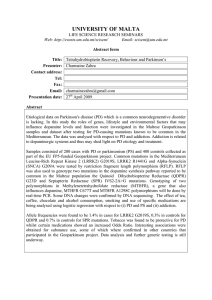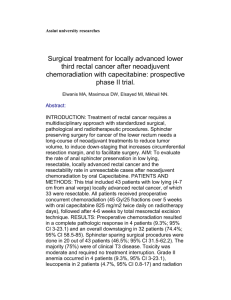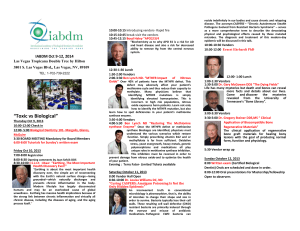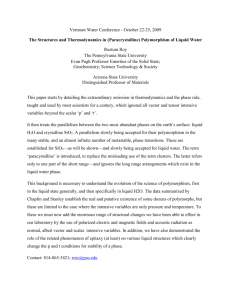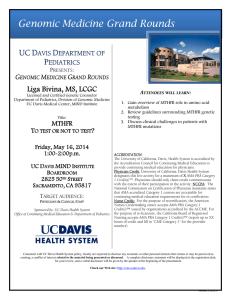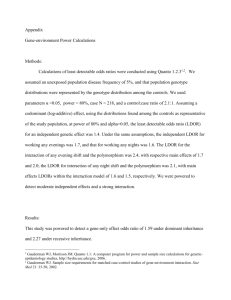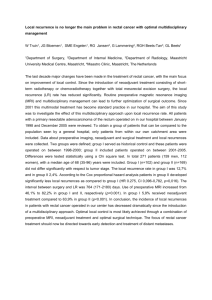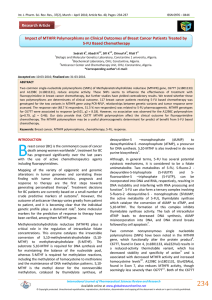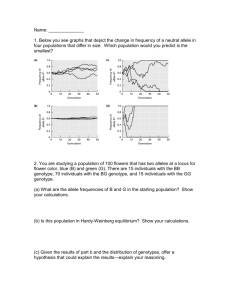Document 13310949
advertisement
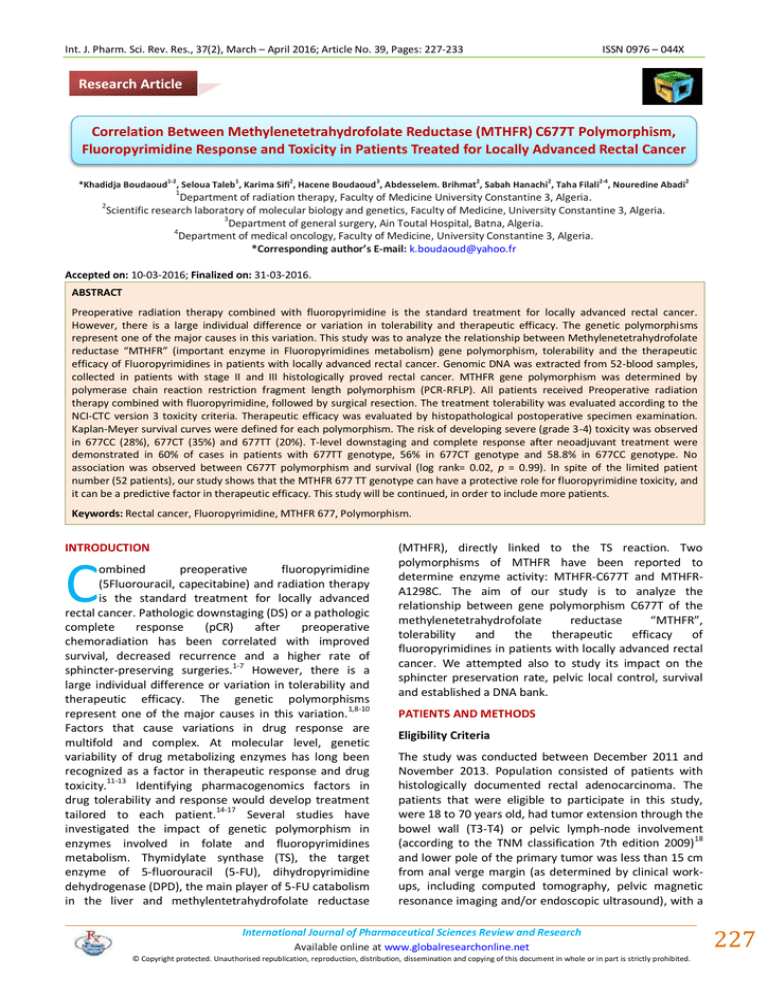
Int. J. Pharm. Sci. Rev. Res., 37(2), March – April 2016; Article No. 39, Pages: 227-233 ISSN 0976 – 044X Research Article Correlation Between Methylenetetrahydrofolate Reductase (MTHFR) C677T Polymorphism, Fluoropyrimidine Response and Toxicity in Patients Treated for Locally Advanced Rectal Cancer 1-2 1 2 3 2 2 2-4 *Khadidja Boudaoud , Seloua Taleb , Karima Sifi , Hacene Boudaoud , Abdesselem. Brihmat , Sabah Hanachi , Taha Filali , Nouredine Abadi 2 1 2 Department of radiation therapy, Faculty of Medicine University Constantine 3, Algeria. Scientific research laboratory of molecular biology and genetics, Faculty of Medicine, University Constantine 3, Algeria. 3 Department of general surgery, Ain Toutal Hospital, Batna, Algeria. 4 Department of medical oncology, Faculty of Medicine, University Constantine 3, Algeria. *Corresponding author’s E-mail: k.boudaoud@yahoo.fr Accepted on: 10-03-2016; Finalized on: 31-03-2016. ABSTRACT Preoperative radiation therapy combined with fluoropyrimidine is the standard treatment for locally advanced rectal cancer. However, there is a large individual difference or variation in tolerability and therapeutic efficacy. The genetic polymorphisms represent one of the major causes in this variation. This study was to analyze the relationship between Methylenetetrahydrofolate reductase “MTHFR” (important enzyme in Fluoropyrimidines metabolism) gene polymorphism, tolerability and the therapeutic efficacy of Fluoropyrimidines in patients with locally advanced rectal cancer. Genomic DNA was extracted from 52-blood samples, collected in patients with stage II and III histologically proved rectal cancer. MTHFR gene polymorphism was determined by polymerase chain reaction restriction fragment length polymorphism (PCR-RFLP). All patients received Preoperative radiation therapy combined with fluoropyrimidine, followed by surgical resection. The treatment tolerability was evaluated according to the NCI-CTC version 3 toxicity criteria. Therapeutic efficacy was evaluated by histopathological postoperative specimen examination. Kaplan-Meyer survival curves were defined for each polymorphism. The risk of developing severe (grade 3-4) toxicity was observed in 677CC (28%), 677CT (35%) and 677TT (20%). T-level downstaging and complete response after neoadjuvant treatment were demonstrated in 60% of cases in patients with 677TT genotype, 56% in 677CT genotype and 58.8% in 677CC genotype. No association was observed between C677T polymorphism and survival (log rank= 0.02, p = 0.99). In spite of the limited patient number (52 patients), our study shows that the MTHFR 677 TT genotype can have a protective role for fluoropyrimidine toxicity, and it can be a predictive factor in therapeutic efficacy. This study will be continued, in order to include more patients. Keywords: Rectal cancer, Fluoropyrimidine, MTHFR 677, Polymorphism. INTRODUCTION C ombined preoperative fluoropyrimidine (5Fluorouracil, capecitabine) and radiation therapy is the standard treatment for locally advanced rectal cancer. Pathologic downstaging (DS) or a pathologic complete response (pCR) after preoperative chemoradiation has been correlated with improved survival, decreased recurrence and a higher rate of sphincter-preserving surgeries.1-7 However, there is a large individual difference or variation in tolerability and therapeutic efficacy. The genetic polymorphisms represent one of the major causes in this variation. 1,8-10 Factors that cause variations in drug response are multifold and complex. At molecular level, genetic variability of drug metabolizing enzymes has long been recognized as a factor in therapeutic response and drug toxicity.11-13 Identifying pharmacogenomics factors in drug tolerability and response would develop treatment tailored to each patient.14-17 Several studies have investigated the impact of genetic polymorphism in enzymes involved in folate and fluoropyrimidines metabolism. Thymidylate synthase (TS), the target enzyme of 5-fluorouracil (5-FU), dihydropyrimidine dehydrogenase (DPD), the main player of 5-FU catabolism in the liver and methylentetrahydrofolate reductase (MTHFR), directly linked to the TS reaction. Two polymorphisms of MTHFR have been reported to determine enzyme activity: MTHFR-C677T and MTHFRA1298C. The aim of our study is to analyze the relationship between gene polymorphism C677T of the methylenetetrahydrofolate reductase “MTHFR”, tolerability and the therapeutic efficacy of fluoropyrimidines in patients with locally advanced rectal cancer. We attempted also to study its impact on the sphincter preservation rate, pelvic local control, survival and established a DNA bank. PATIENTS AND METHODS Eligibility Criteria The study was conducted between December 2011 and November 2013. Population consisted of patients with histologically documented rectal adenocarcinoma. The patients that were eligible to participate in this study, were 18 to 70 years old, had tumor extension through the bowel wall (T3-T4) or pelvic lymph-node involvement (according to the TNM classification 7th edition 2009) 18 and lower pole of the primary tumor was less than 15 cm from anal verge margin (as determined by clinical workups, including computed tomography, pelvic magnetic resonance imaging and/or endoscopic ultrasound), with a International Journal of Pharmaceutical Sciences Review and Research Available online at www.globalresearchonline.net © Copyright protected. Unauthorised republication, reproduction, distribution, dissemination and copying of this document in whole or in part is strictly prohibited. 227 © Copyright pro Int. J. Pharm. Sci. Rev. Res., 37(2), March – April 2016; Article No. 39, Pages: 227-233 good performance status OMS (PS= 0 or 1). However, those with history of malignancy treated with pelvic radiotherapy, or prior chemotherapy, synchronous metastases, and patients rescued from surgery (for other serious medical condition), were not included in this study. Patients who fulfilled the above eligibility criteria were made aware of the study aim and were required to sign the informed consent. Genotyping of C677T SNP Blood samples (6 to 10 ml) were collected on Ethylene Diamine Tetraacetic Acid Tube (EDTA) and used to extract 19 genomic DNA by a salting-out method. The genotyping of C677T MTHFR polymorphism (rs1801133) located in exon 4 of the MTHFR gene was carried out using restriction fragment length polymorphism-polymerase chain reaction (RFLP-PCR). PCR was performed with 200 ng of genomic DNA in a final volume of 50 µl. The PCR mixture contained 5µl of 10 X Gold Taq buffer, 1.5 mM of MgCl2, 2.0 mM of dNTPs, 10 µM of each primer and O.4 U of Taq DNA Polymerase. PCR was done using the primers: Oligo F (forward primer): 5’TGA AGG AGA AGG TGT CTG CGG GA 3', OligoR (reverse primer): 5’AGG ACG GTG CGG TGA GAG TG 3' as described.20 Every PCR was accompanied with a negative control without any genomic DNA. PCR cycling conditions included initial denaturation at 94°C for 5 min, followed by 30 cycles of 30 sec at 94°C, 30 sec at 65°C, and 30 sec at 72°C, and a final extension step at 72°C for 10 min. Restriction enzyme digestion, for the PCR products of C677T was carried out by adding 1X Buffer, 0.2 µl of bovine serum albumin, and 10U of Hinf I to a PCR tube containing 30 µl of PCR product. The mixture was then spun down and incubated overnight at 37°C. Fragments were separated by electrophoresis in a 3% agarose gel and subsequently visualized with ethidium bromide under UV light and then photographed. There were three genotypes of MTHFR C677T: C/C (198 bp); C/T (198 bp/175 bp); T/T (175 bp). Treatment All patients received preoperative concurrent pelvic radiation therapy associated with fluoropyrimidine. The total irradiation dose of 45 Gy was delivered using conventional fractionation (daily fractions of 1.8 Gy/five days per week over 5 weeks). Concurrent fluoropyrimidine were administered as 5 Fluorouracil 2 (750mg/m , day 1-5 in IVI/22 hours) combined with folic acid (20 mg/m²/d over 30 minutes), in two cycles; the first cycle was administered during days 1 to 5 of the externalbeam radiotherapy and the second cycle was administered on days 29 to 33. In some patients treatment was administered as capecitabine continuously throughout the 5 weeks of radiotherapy course at 825 2 mg/m given twice daily 5 days per week during the days when radiotherapy was delivered. Surgery was planned ISSN 0976 – 044X approximately 6-8 weeks after the completion of chemoradiotherapy. Treatment Evaluation We assessed patients by clinical and hematological examination weekly during treatment. Toxicities were evaluated using the National Institute Common Terminology Criteria for Adverse Events version 3.0 (NCI21 CTC v 3.0). Therapeutic efficacy was evaluated by histopathological postoperative specimen examination according to the pTNM staging system. A tumor and/or nodal down-staging was considered when pathological T (pT) and/or pathological N (pN) was lower than clinical T and/or N as defined by computed tomography and/or magnetic resonance imaging obtained after preoperative concurrent chemoradiation. Evaluation of histological regression was carried out according to rectal cancer regression grading established by Wheeler and al22 grade 1, sterilization or only microscopic foci of adenocarcinoma remaining with marked fibrosis; grade 2, marked fibrosis but macroscopic disease; and grade 3, little or no fibrosis with abundant macrocopic disease. Kaplan-Meyer survival curves were defined for each polymorphism. Relationships between MTHFR C677T polymorphism variants and the incidence of grade 3–4 toxicity, tumor response (measured by DS and ypT0 rates) and overall survival were assessed. Overall survival was calculated in weeks between the start of treatment and death of 50% of patients. The SPSS software package (version 22.0J; SPSS Inc.; Chicago, IL, USA) was used for statistical analyses. RESULTS Patients and Tumors Characteristics Between December 2011 and November 2013 a total of 52 patients, 31 men and 21 women, with locally advanced rectal adenocarcinoma were enrolled in this study. Patient characteristics are summarized in Table 1. The median age was 50.8 years (ranging from 23-70 years). Family history of cancer was found in 5 cases (four colorectal cancer and one breast cancer). Average time between first symptoms and diagnosis was 7.4 months (124 months). Tumor was located in the lower rectum in 29 cases (55.7%); 58% of the patients (30 pts) had stage III rectal cancer. Genotyping of MTHFR C677T The genotyping results are presented in Table 2. Twentyfive patients (48%) had homozygous normal or CC genotype. 17 patients were heterozygous (CT) and 10 individuals (19,2%) were homozygous for the mutation (TT). International Journal of Pharmaceutical Sciences Review and Research Available online at www.globalresearchonline.net © Copyright protected. Unauthorised republication, reproduction, distribution, dissemination and copying of this document in whole or in part is strictly prohibited. 228 © Copyright pro Int. J. Pharm. Sci. Rev. Res., 37(2), March – April 2016; Article No. 39, Pages: 227-233 ISSN 0976 – 044X Table 1: Patients and tumor characteristics Patients and tumor characteristics N of patients (N=52) Median age, years Gender Men Women Pathological history Family history of cancer Familial adenomatous polyposis Diabetes High blood pressure Average time: first symptom - diagnosis (month) Clinical symptoms Rectal bleeding Change in bowel habits Mucous discharge Pain Tumor site Low rectum Mid rectum TNM clinical stage T3N0M0: stage II T3N1M0: stage III T3N2M0: stage III T4N1M0: stage III T4N2M0: stage III Chemotherapy 5Fluorouracil+ Folic Acid Capecitabine 50.8 (23-70) Table 2: MTHFR genotypes distribution MTHFR 677 C >T Genotype No of patients Percentage (%) CC CT TT 25 17 10 48 32,6 19,2 31 21 5 2 3 3 7.4 months (1-24 months) 35 15 9 4 29 23 22 27 1 1 1 30 22 Impact of C677T Polymorphism and Fluoropyrimidines Toxicity Tolerability was satisfactory, with grade 3-4 toxicity observed in 13.4% of patients for diarrhea and 15.3% for radiation dermatitis. 677 (CC–CT) genotypes were related to a higher rate of grade 3–4 toxic events respectively (35%, 28%) (Figure 1). Grade 3-4 diarrhea was found in 4CC genotype and 2CT genotype respectively (16% and 11.7%), 8 patients presented grade 3-4 radiation dermatitis (3CC, 4CT et 1TT), only 2 patients with 677TT have grade 3-4 toxicity (20%) (Table 3). Impact of C677T Polymorphism and Treatment Response 35,0% 28,0% 20,0% CT CC TT Figure 1: C677T polymorphism and fluoropyrimidine toxicity After completion of concurrent chemoradiation and before surgery, evaluation of response was defined clinically. Tumor response was assessed by computerized tomography and/or magnetic resonance imaging. Downstaging (DS) and pathological complete response (pCR) or (ypT0N0M0) were evaluated by histopathological postoperative specimen examination according to the pTNM staging system and regression grading established 22 by Wheeler and al. Down-staging and pCR were obtained respectively in 23 patients (44.2%) and 4 patients (7.6%) (Table 4). International Journal of Pharmaceutical Sciences Review and Research Available online at www.globalresearchonline.net © Copyright protected. Unauthorised republication, reproduction, distribution, dissemination and copying of this document in whole or in part is strictly prohibited. 229 © Copyright pro Int. J. Pharm. Sci. Rev. Res., 37(2), March – April 2016; Article No. 39, Pages: 227-233 The best overall response was obtained in 677TT; DS was achieved in 4/10 patients (40%)(Table 4) with pathological complete response pCR in two cases (20%) ISSN 0976 – 044X (Table 5). In those with 677CT and 677CC, DS and pCR were obtained respectively in 6CT, 1CT (35.2%, 5.8%) and 13CC, 1CC (52%, 4%). Table 3: C677T polymorphism and fluoropyrimidines toxicity MTHFR 677 C >T Genotype Leukopenia G3-4 Diarrhea G3-4 Radiation dermatitis G3-4 % CC 0 4 3 28 CT 0 2 4 35 TT 0 1 1 20 Table 4: ypTNM classification TNM N patients T3N0M0 = stage II T3N1M0 = stage III T3N2M0 = stage III T4N1M0 = stage III T4N2M0 = stage III 22 27 1 1 1 ypTNM N patients (ypTNM) T0N0M0 T1N0M0 T2N0M0 4 9 7 T2N1M0 T3N0M0 T3N1M0 T4N1M0 T4N2M0 1 18 12 1 1 N patients (stage) 4 = stage 0 15 = stage I 1 = stage III 18 = stage II 12 = stage III 1 = stage III 1 = stage III Stage 0: 4 Stage I: 15 Stage II:18 Stage III:15 Stage II: 22 Stage III: 30 Table 5: Impact of MTHFR gene polymorphism C667T on response MTHFR C677T genotype N patients Downstaging (DS) Complete response (pCR) CC CT TT 25 17 10 13 6 4 1 1 2 Table 6: Impact of MTHFR gene polymorphism C667T on sphincter-preserving surgery MTHFR C677T genotype Anterior resection Abdominal-perineal resection CC CT TT 14 11 5 30 5 10 7 22 All patients underwent curative surgical resection. 30 patients (57.7%) underwent low anterior resection (sphincter-preserving surgery). 22 patients (42%) patients underwent abdominal-perineal resection in low rectal tumor (distance from the lower pole of the primary tumor to the anal verge was less than 4 cm). In 29 tumors localized in low rectum, 7 patients underwent low anterior resection (n=4; 677CC, n=2:677CT and n=1; 677TT) (Table 6). Impact of C677T Polymorphism on Survival The overall survival of all patients has been followed up every 3 months for the first 2 years after the end of treatment. Overall survival at 2 years was 88% (Figure 2). In this study overall survival was not significantly different among patients with 677 (TT, CT, and CC) genotypes; this was respectively (88.9%, 88.2%, 87.5%; p=0.9) (Figure 3). International Journal of Pharmaceutical Sciences Review and Research Available online at www.globalresearchonline.net © Copyright protected. Unauthorised republication, reproduction, distribution, dissemination and copying of this document in whole or in part is strictly prohibited. 230 © Copyright pro Int. J. Pharm. Sci. Rev. Res., 37(2), March – April 2016; Article No. 39, Pages: 227-233 Figure 2: Overall survival Figure 3: impact of C677T polymorphism on survival DISCUSSION Fluoropyrimidine remain the drugs of choice for preoperative chemoradiation therapy of locally advanced rectal cancer. The present pharmacogenetic study icluded 52 patients with stage II and III rectal cancer, all receiving Fluoropyrimidine-based preoperative chemoradiation. Continuous infusion (CI) of 5-FU has the biological advantage of prolonging the exposure of cells to 5-FU and improving anti-tumor activity. Capecitabine is an orally administered fluoropyrimidine carbamate, which is preferentially converted to active 5-FU in the liver and in the tumor cells. Treatment tolerability, Tumor regression after properative chemoradiation varies substantially among individuals and pathological complete response is recognized as an important prognostic factor for locally advanced rectal cancer. Genetic variability of drug metabolizing enzymes is recognized as a factor in therapeutic response and drug toxicity. MTHFR is an enzyme that plays a role in the metabolism of folate. Alterations in MTHFR enzyme metabolism can affect the activity and function of this enzyme and could also possibly alter the treatment effect. Polymorphisms in the MTHFR gene represent one of these alterations. The aim of the present study was to examine the role of C677T ISSN 0976 – 044X polymorphism on toxicity and response of Fluoropyrimidines in patients with locally advanced rectal cancer. The prevalence of the different MTHFR genotypes 677CC, CT, and TT varies among studies and geographical regions. In this study 25 patients (48%) had homozygous normal or CC genotype. 17 patients were heterozygous (CT) and 10 individuals (19,2%) were homozygous for the mutation (TT). In the prospective French study published in the British Journal of Clinical Pharmacology (BJCP), to evaluate the predictive value of gene polymorphism potentially related to 5FU and oxaliplatin pharmacodynamics in advanced colorectal cancer treated with FOLFOX (enrolled 117 patients), MTHFR genotypes distribution (CC, CT and TT) was shown respectively in 44, 58 and 14 cases (37.6%, 49, 5% and 11.9%). 23 In the American study published in 2011, concerning MTHFR gene polymorphism and 5FU toxicity combined with preoperative concurrent radiotherapy in 131 patients with locally advanced rectal cancer24, MTHFR genotypes (CC, CT and TT) was found in 60, 59 and 12 cases respectively (45.8%, 45.03% and 9.16%). The TT genotype frequency observed in Salvatore Terrazzino study included 125 patients with rectal adenocarcinoma treated with concurrent preoperative chemoradiation therapy using 5FU was lower: 677CC (n=41, 33%), 677CT (n=57, 46%) and 677TT (n=27, 22%)25 In this study, Treatment tolerability was, satisfactory, with grade 3-4 toxicity observed in eight patients (13.4%). We found that patients with the MTHFR TT genotype had a significantly better tolerability than those with the CC/CT genotypes. 677TT genotype seems to have a protective role in the toxicity of grade 3 and 4. Patients with CT MTHFR genotype have an increased risk of developing severe acute toxicity due to fluoropyrimidine treatment. In Etienne-Grimaldi study published in the British Journal of Clinical Pharmacology23, grade 3 and 4 toxicity occurred in 22.9% of cases. None of the analyzed gene polymorphisms were predictive of toxicity considered either as the maximum observed grade, or as the toxicity score. The study of S. Afzal showed that grade 3-4 toxicity was overrepresented among patients with genotype CC 677 with an odds ratio (OR) confidence interval [95% (CI); 1.13- 2.96, p= 0.01] 1.83. 26 The best overall response was obtained in 677TT, in 60% of cases; DS was achieved in 4/10 patients 40%, with pathological complete response pCR in two cases (20%). Sohn and al8 demonstrated on human cancer cells, a very high sensitivity to 5FU in the genotype 677T relative to 677C. In clinical trials, the impact of MTHFR gene polymorphism in tolerance and therapeutic efficiency is still controversial. Cohen27 were the first to describe a link between C677T MTHFR gene polymorphism and tumor response to 5FU-based chemotherapy. In this study conducted on 43 patients with metastatic colorectal cancer, therapeutic response was achieved in all patients with 677TT (5 patients), it was 50% in patients with 677CC. In a retrospective study from Etienne and al International Journal of Pharmaceutical Sciences Review and Research Available online at www.globalresearchonline.net © Copyright protected. Unauthorised republication, reproduction, distribution, dissemination and copying of this document in whole or in part is strictly prohibited. 231 © Copyright pro Int. J. Pharm. Sci. Rev. Res., 37(2), March – April 2016; Article No. 39, Pages: 227-233 ISSN 0976 – 044X including 98 colorectal cancer patients with liver metastases receiving FUFOL, responsiveness was significantly linked to 677C→T genotype, with an increased response rate in 677TT tumors relative to 677CC (odds ratio = 1.88).28 In contrast, a study by Marcuello and al failed to show a link between MTHFR polymorphisms and clinical response in 94 metastatic colorectal cancer patients receiving FU associated with irinotecan or oxaliplatin.29 In Terrazzino Salvatore study, the aim was to evaluate the impact of MTHFR gene polymorphism on tumor regression, in 125 patients treated with concurrent preoperative radiation therapy associated at 5FU. Tumor regression was frequent in patients with genotype 677CC (57%) compared to genotype 677CT and 677TT, which were respectively 25 (27% and 37%). 5. Sauer R, Becker H, Hohenberger W, Preoperative versus postoperative chemoradiotherapy for rectal cancer. N Engl J Med. 351(17), Oct 21 2004, 1731-1740. 6. Sebag-Montefiore D, Stephens RJ, Steele R, Preoperative radiotherapy versus selective postoperative chemoradiotherapy in patients with rectal cancer (MRC CR07 and NCIC-CTG C016): a multicentre, randomised trial. Lancet. 373(9666), Mar 7 2009, 811-820. 7. Ortholan C, Francois E, Follana P, Gerard JP. [Oxaliplatin and preoperative chemoradiotherapy in rectal cancer]. Bull Cancer. 93 Suppl 1, Feb 1 2006, S51-58. 8. Sohn KJ, Croxford R, Yates Z, Lucock M, Kim YI. Effect of the methylenetetrahydrofolate reductase C677T polymorphism on chemosensitivity of colon and breast cancer cells to 5fluorouracil and methotrexate. J Natl Cancer Inst. 96(2), Jan 21 2004, 134-144. Clinical studies on genetic variation exhibited the impact of MTHFR C677T polymorphism in colorectal cancer treated with 5FU on survival rate have mainly focused on patients undergoing treatment for metastatic disease and 5FU- based adjuvant chemotherapy. Most of the reported studies were conducted in a small number of patients (less than 150) and have shown varying results with almost equal numbers showing no effect, a positive effect, or a negative effect on survival, response. 9. Yamayoshi Y, Iida E, Tanigawara Y. Cancer pharmacogenomics: international trends. Int J Clin Oncol. 10(1), Feb 2005, 5-13. CONCLUSION In spite of the limited patient number, our study shows that the MTHFR 677 TT genotype can have a protective role of fluoropyrimidine toxicity, and it can be a predictive factor in therapeutic efficiency. This study will be continued, in order to include more patients and to analyze the second polymorphism in MTHFR gene (1298 A>C). Due to the encouraging results of this time limited study, further patient follow-up and study analysis is warranted. REFERENCES 1. Molinari C, Matteucci F, Caroli P, Passardi A. Biomarkers and Molecular Imaging as Predictors of Response to Neoadjuvant Chemoradiotherapy in Patients With Locally Advanced Rectal Cancer. Clin Colorectal Cancer. 14(4), Dec 2015, 227-238. 2. De Caluwe L, Van Nieuwenhove Y, Ceelen WP. Preoperative chemoradiation versus radiation alone for stage II and III resectable rectal cancer. Cochrane Database Syst Rev. 2, 2013, CD006041. 3. Sauer R, Liersch T, Merkel S, Preoperative versus postoperative chemoradiotherapy for locally advanced rectal cancer: results of the German CAO/ARO/AIO-94 randomized phase III trial after a median follow-up of 11 years. J Clin Oncol. 30(16), Jun 1 2012, 1926-1933. 4. Bujko K, Nowacki MP, Nasierowska-Guttmejer A, Michalski W, Bebenek M, Kryj M. Long-term results of a randomized trial comparing preoperative short-course radiotherapy with preoperative conventionally fractionated chemoradiation for rectal cancer. Br J Surg. 93(10), Oct 2006, 1215-1223. 10. Derwinger K, Wettergren Y, Odin E, Carlsson G, Gustavsson B. A study of the MTHFR gene polymorphism C677T in colorectal cancer. Clin Colorectal Cancer. 8(1), Jan 2009, 4348. 11. Ceppa F, Fontan E, Cremades S, [Role of pharmacogenetics in chemotherapy of colorectal cancers]. Rev Med Interne. 28(9), Sep 2007, 594-602. 12. Stohlmacher J. Pharmacogenetics in gastrointestinal tumors. Onkologie. 28(8-9), Aug 2005, 435-440. 13. Sekine I, Saijo N. Polymorphisms of metabolizing enzymes and transporter proteins involved in the clearance of anticancer agents. Ann Oncol. 12(11), Nov 2001, 15151525. 14. Burnat P, Ceppa F, Perrier F, Gidenne S, Van Tran P, Vittori E. Pharmacogénétique des anticancéreux. Médecine et Armées. 31, 2003, 490-494. 15. Bourel M, Ardaillou R. [Pharmacogenetics and pharmacogenomics]. Bull Acad Natl Med. 190(1), Jan 2006, 9-22; discussion 22-23. 16. Lotz P, Brault D. Complications biologiques des traitements médicaux des cancers. Feuill. Biol. 252, 2003, 59-62. 17. Robert J. Pharmacogénétique et pharmacogénomie. Bull. Cancer. 93, 2006, 113-123. 18. Sobin LH, Gospodarowicz MK, Wittekind C, International Union against Cancer. TNM classification of malignant tumours. 7th ed. Chichester, West Sussex, UK; Hoboken, NJ: Wiley-Blackwell; 2010. 19. Miller SA, Dykes DD, Polesky HF. A simple salting out procedure for extracting DNA from human nucleated cells. Nucleic Acids Res. 16(3), Feb 11 1988, 1215. 20. Frosst P, Blom HJ, Milos R, A candidate genetic risk factor for vascular disease: a common mutation in methylenetetrahydrofolate reductase. Nat Genet. 10(1), May 1995, 111-113. 21. Program CTE. Common Terminology Criteria for Adverse Events v3.0 (CTCAE). 2006. Accessed March 31, 2003. International Journal of Pharmaceutical Sciences Review and Research Available online at www.globalresearchonline.net © Copyright protected. Unauthorised republication, reproduction, distribution, dissemination and copying of this document in whole or in part is strictly prohibited. 232 © Copyright pro Int. J. Pharm. Sci. Rev. Res., 37(2), March – April 2016; Article No. 39, Pages: 227-233 22. Wheeler JM, Warren BF, Mortensen NJ, Quantification of histologic regression of rectal cancer after irradiation: a proposal for a modified staging system. Dis Colon Rectum. 45(8), Aug 2002, 1051-1056. 23. Etienne-Grimaldi MC, Milano G, Maindrault-Goebel F, Methylenetetrahydrofolate reductase (MTHFR) gene polymorphisms and FOLFOX response in colorectal cancer patients. Br J Clin Pharmacol. 69(1), Jan 2010, 58-66. 24. Thomas F, Motsinger-Reif AA, Hoskins JM, Methylenetetrahydrofolate reductase genetic polymorphisms and toxicity to 5-FU-based chemoradiation in rectal cancer. Br J Cancer. 105(11), Nov 22 2011, 16541662. 25. Terrazzino S, Agostini M, Pucciarelli S, A haplotype of the methylenetetrahydrofolate reductase gene predicts poor tumor response in rectal cancer patients receiving preoperative chemoradiation. Pharmacogenet Genomics. 16(11), Nov 2006, 817-824. ISSN 0976 – 044X 26. Afzal S, Jensen SA, Vainer B, MTHFR polymorphisms and 5FU-based adjuvant chemotherapy in colorectal cancer. Ann Oncol. 20(10), Oct 2009, 1660-1666. 27. Cohen V, Panet-Raymond V, Sabbaghian N, Morin I, Batist G, Rozen R. Methylenetetrahydrofolate reductase polymorphism in advanced colorectal cancer: a novel genomic predictor of clinical response to fluoropyrimidinebased chemotherapy. Clin Cancer Res. 9(5), May 2003, 1611-1615. 28. Etienne MC, Ilc K, Formento JL, Thymidylate synthase and methylenetetrahydrofolate reductase gene polymorphisms: relationships with 5-fluorouracil sensitivity. Br J Cancer. 90(2), Jan 26 2004, 526-534. 29. Marcuello E, Altes A, Menoyo A, Rio ED, Baiget M. Methylenetetrahydrofolate reductase gene polymorphisms: genomic predictors of clinical response to fluoropyrimidine-based chemotherapy? Cancer Chemother Pharmacol. 57(6), Jun 2006, 835-840. Source of Support: Nil, Conflict of Interest: None. International Journal of Pharmaceutical Sciences Review and Research Available online at www.globalresearchonline.net © Copyright protected. Unauthorised republication, reproduction, distribution, dissemination and copying of this document in whole or in part is strictly prohibited. 233 © Copyright pro
